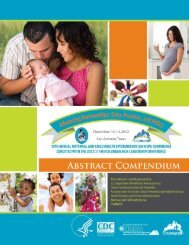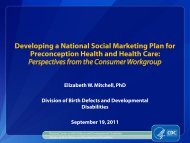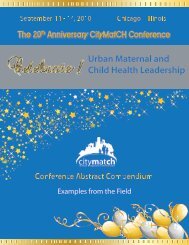Conference Abstract Compendium Examples from the ... - CityMatCH
Conference Abstract Compendium Examples from the ... - CityMatCH
Conference Abstract Compendium Examples from the ... - CityMatCH
You also want an ePaper? Increase the reach of your titles
YUMPU automatically turns print PDFs into web optimized ePapers that Google loves.
ACCOMPLISHMENTS/RESULTSMore than 500 practices have been trained by this program since 2003.2009 <strong>CityMatCH</strong> Urban MCH Leadership <strong>Conference</strong>An internal evaluation took place in 2007-08 and included key informant interviews and a pre-post designsurvey of private practices. A total of 280 providers (physicians, mid-levels, and nursing staff) completeda pre-intervention survey; 104 providers completed a second survey 3-6 months after <strong>the</strong> intervention(training).The program was effective in increasing provider knowledge about folic acid and unintended pregnancy.The program also increased <strong>the</strong> proportion of providers who reported counseling women about folic acid<strong>from</strong> 51% to 67% at annual exams and <strong>from</strong> 48% to 60% at routine visits. The survey identified <strong>the</strong> mostcommonly discussed preconception health topics: folic acid, tobacco, alcohol, and nutrition/exercise.BARRIERS• Securing an appointment to provide training for a private practice can be challenging.• The success of <strong>the</strong> program in a specific practice often relies on <strong>the</strong> commitment of <strong>the</strong> OfficeChampion.LESSONS LEARNED• In-office trainings can influence provider knowledge and counseling behaviors.• This program can reach many more women than a traditional public health campaign; each providerwho receives <strong>the</strong> training has <strong>the</strong> potential to reach hundreds of women.• Rural practices are more receptive to this type of program than urban practices due to more flexiblescheduling and less attention <strong>from</strong> pharmaceutical representatives.• Trainings need to be kept short: 15-20 minutes. Many practices expect to receive a snack or lunch.• An important role of health educators is to facilitate dialogue during <strong>the</strong> training about who isresponsible for providing preconception health education for patients and how that can best beaccomplished.• Multiple visits ra<strong>the</strong>r than a single training by a regional coordinator can improve an office’s ability topromote preconception messages such as folic acid appropriately to female patients.INFORMATION FOR REPLICATIONThis program is one component of a comprehensive folic acid campaign in North Carolina. Fundingcomes <strong>from</strong> a Vitagrant settlement and ongoing state support. Many partners collaborate, including <strong>the</strong>state health department (contract administration), a statewide MCH health non-profit (materialsproduction), and March of Dimes (program administration).61







